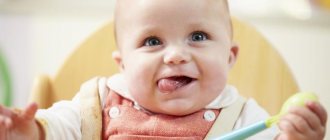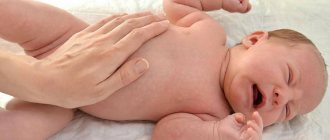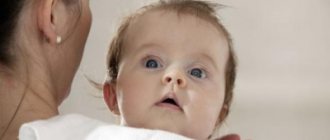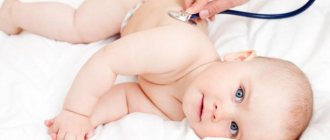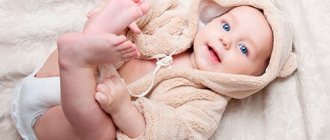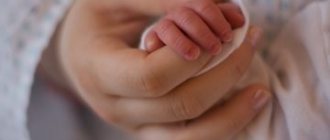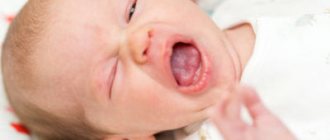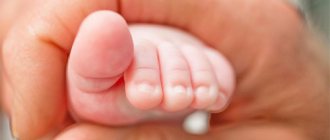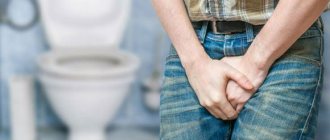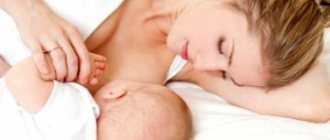There are many reasons why a child has wet hands and feet. In what cases can a mother cope on her own, and when should she go to the doctor? What could be the reasons? How to protect your baby from wet hands and feet? We will answer these questions in this article.
If a child is capricious and cries, these may be the causes of hyperhidrosis
Natural causes that cause sweating
Sweating is a physiological response of the body to internal and external factors. Its task is to normalize water-salt metabolism and establish thermoregulation. Factors such as an emotional outburst, physical activity, excessive fluid intake, being in a stuffy environment, too hot clothes or blankets, as well as some illnesses can cause increased sweating.
A baby's feet and hands sweat not only from natural causes. Such a manifestation may indicate the development of some pathological process in the baby’s body, but there is no need to immediately panic. First, it is necessary to exclude all natural factors that affect the baby’s thermoregulation.
The mechanism of thermoregulation is poorly developed in newborns. In addition, the child has just begun to get used to the influences of environmental factors. That is why even a slight upward change in temperature or overheating from clothing causes an acute reaction in the baby, and increased sweating begins.
Causes not related to diseases
Often the cause of the problem lies in superficial factors. This condition is not dangerous, but it requires adjustment to improve the child’s well-being. It is enough just to remove the negative factor, and the problem will go away.
External factors contributing to the problem:
- Excessively high ambient temperature. Sweaty palms are often observed on hot summer days and during the heating season, if the apartment warms up too much;
- When wearing clothes that do not allow enough air to pass through, this condition can also develop. This pathology occurs especially often in those who prefer synthetic clothing;
- Excess water in the body can also result in increased sweating. At the same time, the baby needs to drink very little for this factor to occur;
- Increased activity also provokes increased work of the sweat glands. However, this factor is not only harmless, but also useful;
- Lack of physical activity can also be a reason that causes sweaty palms. However, in this case, everything happens the other way around. That is, the body becomes unaccustomed to stress, and at the slightest activity it begins to sweat heavily;
- Nervous stress can also cause a similar situation. Crying, overexcitement and other similar factors cause the child to sweat;
- The use of drugs with similar side effects can also cause hyperhidrosis.
In such situations, increased sweating occurs for completely natural reasons. It is enough just to eliminate the negative factor, and the baby’s palms will stop sweating.
A few words about the features of a baby’s thermoregulation
The temperature of the human body remains at the same level, regardless of the climate. If a person is healthy, then the value does not exceed 36.6-37 °C. It is the thermoregulation mechanism that maintains the temperature at the same level. However, it works differently in children. And parents who ask themselves the question why their baby’s hands and feet sweat, need to know about this.
So, immediately after birth, the baby experiences an unstable temperature due to the following factors:
- when overheated too much;
- if hypothermia of the legs is observed;
- from eating food;
- with crying and colic;
- if the child has congenital pathology and diseases.
The younger the baby, the greater the heat transfer in his body. In young children, thermoregulation is imperfect. Therefore, parents should carefully ensure that the baby is not cold or hot. First of all, a baby’s legs and arms sweat if his family has chosen the wrong clothes for him.
What diseases may excessive sweating indicate?
According to doctors, if a baby has wet hands and feet, they may sweat due to certain diseases, the presence of which should be checked by a specialist first:
- thyroid diseases;
- hormonal disbalance;
- impaired renal and pulmonary function;
- hypertension;
- rickets;
- helminth damage;
- diabetes.
Rickets is a serious disease and occurs when there is insufficient vitamin D in the child’s body. With this diagnosis, the baby experiences severe sweating of the legs, back of the head and palms. In addition, the phenomenon can be observed after prolonged incorrect use of medications.
Why do my baby's feet and hands sweat? The reasons highlighted by medical experts are as follows:
- Incompletely formed endocrine system.
- Increased baby weight.
- Artificial feeding.
- Problems in the functioning of the digestive system.
- Taking antibiotics, drugs that constrict blood vessels, and antipyretics.
Remember that premature babies suffer from sweating of the hands and feet much more often than babies born at full term.
Baby's heat rash
Children often suffer from heat rash. This is especially true for children born in the hot months of the year. This happens because the secretion of the sweat glands does not have time to evaporate and irritates the baby’s delicate skin.
Miliaria can be crystalline and is what usually occurs in children. This type of rash is not dangerous and has no symptoms other than papular pimples. If the miliaria causes itching and anxiety in the child, then this phenomenon is inflammatory in nature and requires immediate consultation with a specialist. This problem often occurs when an infection is attached.
What Doctor Komarovsky says
What to do if your baby’s hands and feet are sweating? Komarovsky, one of the best pediatricians, says that the temperature of the hands and feet of even an adult, and not just a child, is somewhat lower than in the area where we are accustomed to placing a thermometer. If, after feeling the baby’s legs, you feel that they are cold, you need to pay attention not to the thermometer readings, but to the degree of intensity of blood circulation. If the skin is cool and has a pink tint, it means the baby is not cold. In the case when cyanosis is observed, it is necessary to cover the child, because he is freezing.
Useful tips and preventive measures
There are some factors that contribute to increased sweating of a child's feet and hands. If they are eliminated, the situation will change in a positive direction.
- Ventilate the apartment every day, and the room where the child sleeps at least twice a day.
- Give your baby a warm bath every day from the first days of life.
- The baby should take air baths. To do this, you need to undress him completely, remove the diaper and hold him without clothes for several minutes.
- Give your child a massage. A professional massage therapist is invited to gain some knowledge. After several sessions, the mother will be able to carry out the procedure on her own.
- Do not lubricate baby's hands and feet with baby cream and oil.
- Breastfeed your baby for as long as possible, because natural feeding is the prevention of many diseases.
- Buy clothes for your child that are made from natural materials.
- Wash children's clothes using products that are intended for this purpose.
- Do not wrap your baby in warm clothes or tightly swaddle him. There is also no need to wrap your baby in an extra blanket unnecessarily.
- Add decoctions of plants to your bathing water: calendula, string, chamomile, oak bark.
Experts note that increased sweating of the feet and palms of an infant in some cases occurs due to stressful situations. For example, if parents raise their voices too much during a conversation, mom and dad are nervous or in a bad mood.
If all external irritants have been excluded, and the baby’s feet and hands are sweating, it is imperative to visit a specialist. They will be able to make an accurate diagnosis and tell you how to treat the child.
Prevention of sweating
Sweaty palms are easier to prevent than to treat. In the case of external factors, this is quite easy to do. You just need to follow a few rules.
How to prevent the problem:
- Don't bundle up your child. The baby should be dressed appropriately for the weather and should not be hot;
- Use clothes made from natural fabrics. For kids, this rule is especially true;
- It is extremely important to maintain good personal hygiene. The child should bathe daily. Underwear and socks should not be worn more than one day;
- Proper nutrition is very important for children. If the child is no longer breastfed, then it is necessary to provide him with a correct and balanced diet. It should contain a minimum of junk food and a maximum of healthy foods containing large amounts of vitamins and minerals.
Sweaty hands in a child is a problem that is worth paying attention to. It is quite possible that it is a symptom of some dangerous disease. Therefore, listen to your child, do not ignore his whims and be healthy.
Alarming symptoms
If suddenly the baby experiences increased sweating of the arms and legs, then parents should be concerned in the following cases:
- When the baby sweats frequently and heavily during feeding or playing.
- If the sweat smells strongly and the baby’s skin becomes irritated.
- In case there is sweating in certain parts of the body.
- If moist areas of the skin are cold.
You should also be concerned if your baby sleeps poorly and becomes restless.
In the first stages of the disease, the child’s legs, armpits and arms sweat. This is often associated with the functioning of the sweat glands or nervous overexcitation. Some areas of the body become sweaty as a reaction to stress or when environmental conditions change. At the same time, the sweat smells strongly and has a sour smell.
Ways to help temporarily reduce sweating
For teenagers, products that help temporarily eliminate sweating are relevant. After all, in their case the problem will be present for some time. Among the remedies for solving the problem of sweaty palms are:
- Talcum powder used to treat palms. They absorb some of the sweat and due to this, the palms remain dry;
- Gels temporarily block the activity of sweat glands. They are applied for a while and then washed off, leaving a film. This remedy will help eliminate sweating for about seven days;
- You can also resort to using pharmacy antiperspirants. Such products will temporarily block the activity of the sweat glands.
What to do?
Are your baby's feet and hands sweating? Surely every parent wants to know what to do correctly in such a situation. In any case, there is no need to self-medicate. If you have eliminated all irritating external factors and sweating is still observed, you need to show the child to a specialist. He will prescribe appropriate tests, conduct an examination and be able to find out whether the baby has hidden serious diseases. Remember that if a baby’s feet and hands sweat, treatment for secondary hyperhidrosis can only be prescribed by a doctor. For primary hyperhidrosis, he will give you useful recommendations.
Primary and secondary hyperhidrosis
It is worth noting that hyperhidrosis is divided into two types. It can be primary and secondary. Types of hyperhidrosis:
- Primary hyperhidrosis is present at birth. The causes of this disease have not been studied. It is believed that it is inherited;
- The secondary type of pathology is diagnosed when it is not an independent disease, but only a sign of some disease.
Secondary hyperhidrosis is the most dangerous, as it can be a symptom of a serious illness.
What tests need to be taken?
If you follow all of the above recommendations, regularly ventilate the room and do not overheat your child, but his hands and feet continue to sweat, the reason probably lies in the development of certain diseases. Only a doctor can exclude them. To do this, you need to pass the appropriate tests:
- General blood test and urine test.
- Sweat analysis to detect cystic fibrosis.
- Blood test to determine sugar and hormone levels.
- Analysis determining the Wasserman reaction.
The child is also sent for an ultrasound examination of the thyroid gland. Such a thorough examination is necessary so that the doctor can make an accurate diagnosis.
The list of tests is approximate and may be shortened or supplemented. After all, each case is individual. But doctors will definitely find out the reasons why the baby’s hands and feet sweat.
Diagnostic methods
Hyperhidrosis of the palms requires careful diagnosis. If such a problem occurs in children, you should first of all contact a pediatrician. The pediatrician will study the medical history and also examine the little patient.
Next, a test is performed to determine the degree of pathology. To do this, apply an iodine solution to the palms, and after it dries, starch. When your palms begin to sweat, the starch turns blue when it reacts with iodine. The stage of hyperhidrosis is determined by the scale of the painted surface. After this, an examination is scheduled.
Usually the patient is prescribed a general and biochemical analysis of blood and urine to identify inflammatory and other negative components in their composition. Also, depending on the suspected cause, one or another hardware test is prescribed.
Causes of sweaty feet in infants
In young children under one year of age, muscle tone is increased . They clench their fists and stand on tiptoes, which makes the baby’s feet sweat. These are the main natural causes of sweaty feet in a baby, which will disappear within a year. There are also a number of reasons why a child’s feet may sweat:
- Clothes and shoes that are poorly breathable. It is preferable to wear tights for the child made from natural fibers that allow air to pass through;
- Heredity. With age, foot sweating disappears;
- With rickets, increased sweating may also occur. At the same time, the baby sleeps and eats poorly, the skin is pale, and the sweat smells bad . This disease is observed until the age of two;
- Sweating is possible if the thyroid gland is not functioning properly . The sweat smells unpleasant, like that of an adult. In this case, you need to contact a specialist.
First of all, you need to exclude all natural causes of sweating . If your baby’s feet sweat (the reasons are listed above), then it is necessary to create comfortable living conditions:
- The air temperature should not be higher than 22 degrees, and the humidity should not be higher than 60%. The room must be regularly ventilated to supply oxygen;
- The child's body must breathe. To do this, clothes must be made from natural materials: linen, cotton. No need to wrap the baby up. The blanket should be light.
- You should bathe your baby every day to keep the skin clean and breathable.
- Stressful situations also provoke increased sweating. These include lack of sleep, undereating or overeating;
- With vegetative-vascular dystonia, sweating can also be observed.
Is sweating normal?
Sweating is a completely normal process for a healthy person. After all, it is due to the separation of this secretion through the pores on the skin that the body’s thermoregulation occurs. In addition, this process is involved in the removal of toxins and acid-salt metabolism, and sweat also performs a barrier function, preventing the penetration of microorganisms through the skin.
The first few months after birth, the thermoregulation of the child’s body is not fully formed. Therefore, even when sweating in hot weather, in a baby up to one month old, a temperature rise of up to 37 degrees is considered normal.
Sweating is normal for both babies and toddlers. Of course, if it occurs within reasonable limits. It is worth noting that sweating in adolescents during puberty and in children is different. This happens because during these periods different glands are responsible for all processes.
Glands responsible for sweating:
- Eccrine glands are located throughout the body. They are present in large numbers, but they are especially numerous on the palms, feet, armpits, neck, face and head. These elements are responsible for thermoregulation of the body, as well as for the removal of toxins, acid-base balance and protection against bacteria. They work for both children and adults.
- Apocrine glands are present only in certain areas of the body. Their functions are still not fully understood. It is only known that they secrete pheromones that determine the natural aroma of the body. These components of the system are present from birth, but begin to work only during puberty.
This is why teenagers sweat much more than young children. However, normally this manifestation should not be critical.
Causes of excessive sweating and methods of treatment
When all natural causes have been eliminated, and the child continues to sweat, you should contact a specialist. You may need to get tested to determine the cause of your excessive sweating.
In medicine, this process is called hyperhidrosis . It can be primary (idiopathic) and secondary.
The first type is inherited. There is an assumption that it occurs with an increased number of sweat glands. Another reason may be a stronger reaction to various external and internal stimuli. One in two thousand people are affected by this type of sweating.
The primary type of hyperhidrosis can occur at three months of age, when they begin to notice that the baby’s hands and feet, as well as the armpits and head, are sweating. During puberty, an exacerbation may begin. Treatment of the baby consists of carrying out hygienic procedures .
Secondary hyperhidrosis occurs against the background of another disease. Then not only your hands and feet sweat, but your whole body. Sweating is accompanied by other symptoms, these include: lethargy, excessive excitability, insomnia, poor appetite . If the temperature rises, you should consult a doctor . It is also possible that a rash may appear on the child’s body, stomach upset, vomiting, and shortness of breath .
Only a specialist can determine the exact cause of increased sweating. This requires an examination and test results. Let's look at some of the causes of secondary hyperhidrosis.
- One of the signs of VSD is sweating of the baby's hands and feet. Treatment involves creating a calm environment for the child. Therapeutic massage and water treatments will also help.
- Also, the reason why a baby’s hands, feet and other parts of the body sweat may be previous viral diseases . If there is a heart complication, shortness of breath may be added to excessive sweating.
To prevent the causes of increased sweating, a favorable psychological environment must be created for the baby. The room must be regularly ventilated. It is also important to harden the baby from the first days of life. All this will contribute to proper, healthy development.
Find out right now about the most useful drug Plantex for newborns (instructions for use). For colic, constipation, bloating, regurgitation and to normalize digestion.
Treatment
The treatment regimen for hyperhidrosis depends on what caused it. If the disease is eliminated, sweating also disappears.
Plantar hyperhidrosis in a baby can be caused by excessive wrapping
It is extremely important to adhere to preventive measures:
- Monitor the child's hygiene. Wash hands and feet with soap. When bathing, add sea salt and herbal infusions (oak bark, sage, mint) to the bath.
- Before going to bed, you can apply baby powder to your feet and palms.
- Change socks daily. Choose bedding and clothing from natural materials. It is necessary to dress your baby according to the weather and try to avoid overheating.
- Ventilate the children's room and be sure to control the air temperature in it.
- Hardening, regular walks, exercises - all this will benefit children who suffer from hyperhidrosis.
- Foot massage is effective. Every day your baby needs to pat and pinch his feet.
- In order for the baby to experience as little stress as possible, he needs to be held more often, since sweating in many cases can occur against the background of nervous disorders.
- If the baby is hyperactive, he may be prescribed sedatives. The pediatrician should select them, taking into account the individual characteristics of the child.
- In order to prevent rickets, you need to give your baby vitamin D and allow him to sunbathe.
After bathing, you don’t need to wrap your baby right away
